The 7 best brain puzzles for post-injury recovery include matching puzzles to restore memory, crosswords for language processing, sequential pattern games for cognitive flexibility, visual-spatial challenges for coordination, attention-building brain teasers for focus, logic grids for problem-solving, and digital adaptive puzzles for progressive improvement. You’ll benefit most by starting at an appropriate difficulty level and gradually increasing complexity as your abilities improve. Discover how each puzzle type targets specific cognitive functions to optimize your rehabilitation journey.
Matching Puzzles for Memory Restoration
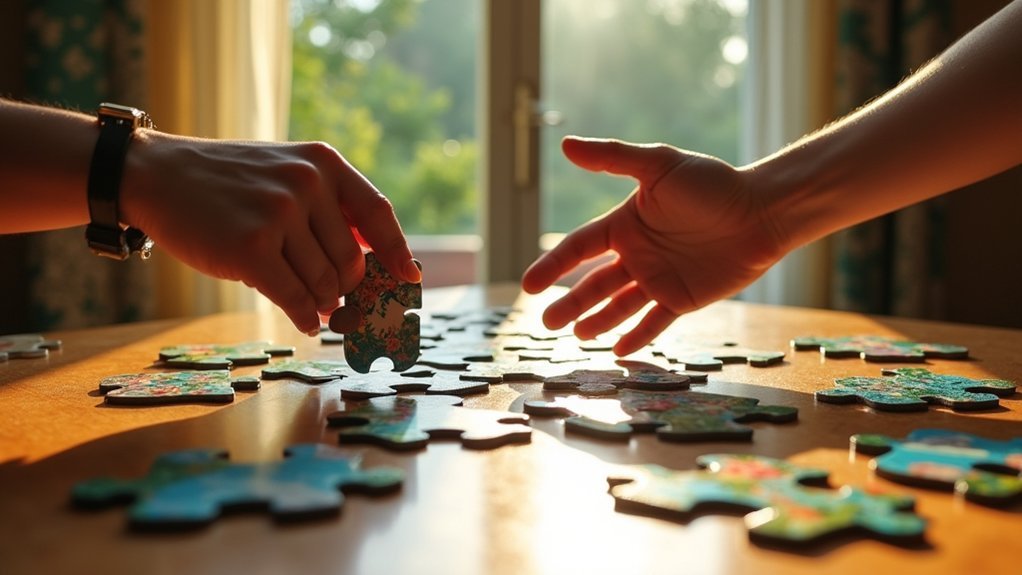
When recovering from a brain injury or cognitive decline, matching puzzles serve as powerful tools for memory restoration. These games strengthen brain connections by stimulating synaptic pathways, helping reorganize neural networks essential for recovery.
You’ll benefit from the dual coding effect when using puzzles that combine pictures and words, as they engage both verbal and visual memory systems. The picture superiority effect makes image-based matching games particularly effective—pictures are simply more memorable than words alone.
What makes these puzzles ideal for rehabilitation is their adaptability. They can be tailored to your specific cognitive abilities and recovery stage. Recent research demonstrates that similar cognitive activities like crossword puzzles significantly improve cognitive outcomes and reduce brain shrinkage in older adults with mild cognitive impairment.
Whether you’re working with a therapist or practicing independently, matching exercises provide accessible, engaging cognitive training that supports your memory recall and learning functions throughout the recovery process.
Crossword Puzzles for Language Processing
Crossword puzzles can greatly expand your vocabulary while you recover, introducing you to new words and reinforcing ones you already know.
You’ll find these puzzles available in various difficulty levels, allowing you to start simple and progress as your language processing skills improve.
Research shows completing crossword puzzles four times weekly for 30 minutes may lead to less brain shrinkage in areas responsible for memory and thinking.
Whether you’re working with a therapist or independently, crosswords offer a customizable challenge that adapts to your current cognitive abilities and recovery stage.
Vocabulary Expansion Benefits
As your brain recovers from injury or cognitive decline, engaging with crossword puzzles offers remarkable vocabulary enhancement opportunities. You’ll experience reinforced word retention through multiple exposures to terms and their definitions, creating stronger neural pathways for language recall.
| Vocabulary Benefit | Brain Impact | Recovery Value |
|---|---|---|
| Word retention | Hippocampus activation | Improved recall |
| Contextual learning | Cortical stimulation | Enhanced comprehension |
| Definition mastery | Neural connection formation | Better communication |
| Semantic processing | Language network engagement | Increased fluency |
| Active learning | Cognitive flexibility | Greater confidence |
Studies confirm vocabulary improvements across all proficiency levels when using crosswords as rehabilitation tools. The puzzle format encourages independent learning while making the recovery process more engaging. You’ll find yourself not just remembering words but understanding their applications in different contexts—a vital skill for rebuilding language capabilities after cognitive setbacks.
Flexible Difficulty Levels
Adjustable challenge levels in crossword puzzles make them ideal rehabilitation tools for individuals at any recovery stage.
You’ll find these puzzles can be customized to match your current cognitive abilities while still providing the right amount of challenge to stimulate recovery.
Whether you’re just beginning your recovery journey or making significant progress, there’s a crossword puzzle designed for you.
Modern puzzle platforms offer:
- Variable grid sizes from small 5×5 grids to complex 21×21 layouts
- Adjustable clue complexity ranging from straightforward definitions to cryptic wordplay
- Topic-specific puzzles that target particular vocabulary areas relevant to your rehabilitation needs
This flexibility allows your speech therapist to gradually increase difficulty as you progress, creating a tailored approach that grows with your improving language processing abilities. Studies show that regular engagement with crossword puzzles can provide significant stress relief during the recovery process, helping patients manage anxiety while rebuilding cognitive functions.
Sequential Pattern Games for Cognitive Flexibility
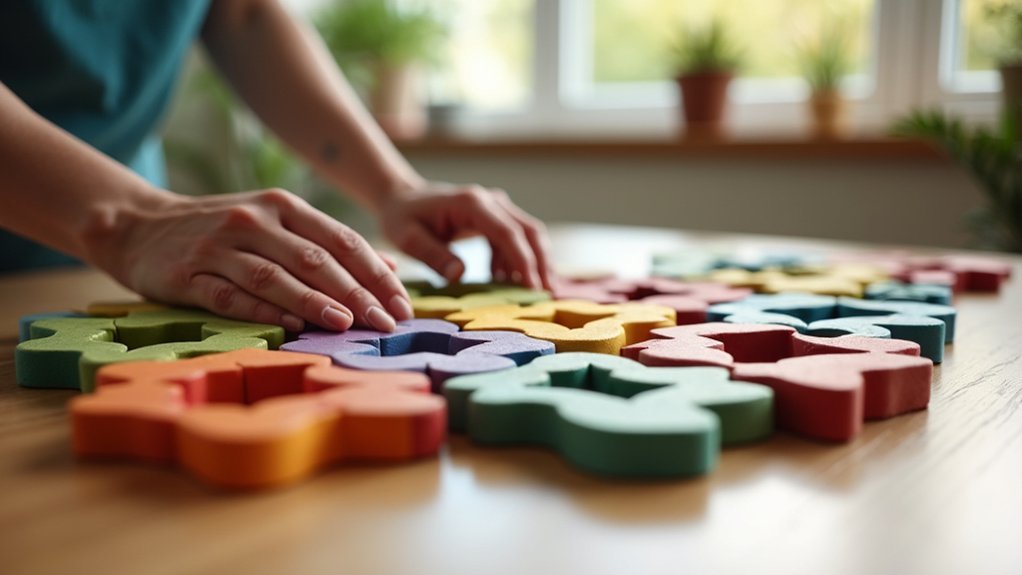
Sequential pattern games offer you a customized path to cognitive recovery through their gradual challenge progression, allowing you to build skills at your own pace.
You’ll find these games particularly effective for strengthening working memory as you identify, recall, and manipulate increasingly complex patterns.
Your brain’s neuroplasticity responds exceptionally well to the memory pattern benefits these puzzles provide, creating new neural pathways that support broader cognitive flexibility in everyday tasks. Research on League of Legends players demonstrates how games requiring cognitive flexibility can enhance adaptation to changing environments during recovery.
Gradual Challenge Progression
When recovering from brain injuries, the ideal cognitive exercises follow a carefully structured progression of difficulty. Adaptive games that gradually increase challenges keep you engaged without overwhelming your cognitive resources, which is essential for maintaining motivation throughout your recovery journey. Research focusing on educational patterning has shown that recognizing consistent rules in alternating sequences significantly enhances cognitive rehabilitation outcomes.
Research suggests optimal training should include approximately 20 sessions spread over 4-6 weeks, with regular assessments to customize the difficulty based on your progress. This structured approach maximizes cognitive benefits and supports neuroplasticity.
For best results, incorporate:
- Games with adaptive difficulty settings that automatically adjust to your performance
- A variety of sequential pattern activities that target different cognitive aspects
- A consistent schedule of 15-20 hours of gameplay distributed across several weeks
This gradual progression approach helps maintain engagement while systematically rebuilding your cognitive flexibility skills.
Memory Pattern Benefits
Memory pattern games provide remarkable benefits for cognitive recovery by strengthening your brain’s flexibility and adaptability. These sequential challenges train your mind to switch between different mental sets, a vital skill when recovering from cognitive impairment.
When you engage with rule-governed sequences, you’re improving the same neural pathways used for counting and mathematical thinking. The predictable nature of patterns makes learning more accessible while still challenging your executive functions.
You’ll find these games particularly effective because they can be adjusted to match your recovery stage. Starting with simple pictorial patterns and progressing to more complex sequences guarantees continuous cognitive growth without overwhelming your brain. Research consistently shows that these activities enhance working memory capacity, helping you maintain and process information during recovery tasks.
Children especially benefit from these activities, developing early mathematical understanding while enhancing cognitive flexibility.
For peak recovery, incorporate memory pattern games that require you to adapt to changing sequences and recognize abstract relationships.
Visual-Spatial Challenges for Coordination Recovery
Through targeted visual-spatial exercises, your brain can develop new pathways that enhance coordination and motor recovery after injury. Research confirms these challenges particularly benefit stroke patients with spatial neglect, improving both perception and motor skills.
Visual-spatial training creates neural pathways that restore movement and perception after brain injuries, especially benefiting neglect patients.
The cerebellum—your brain’s coordination center—activates during these exercises, stimulating motor systems and promoting learning. Studies indicate complex motor interventions can significantly enhance both motor skills and higher-order cognitive functions in rehabilitation settings.
You’ll likely experience improvements in:
- Grip strength and dexterity – essential for daily activities
- Movement coordination – creating more fluid motion patterns
- Cognitive function – enhancing working memory and mental rotation skills
Effective techniques include optokinetic stimulation, visual scanning exercises, and drawing activities.
Attention-Building Brain Teasers for Focus Training
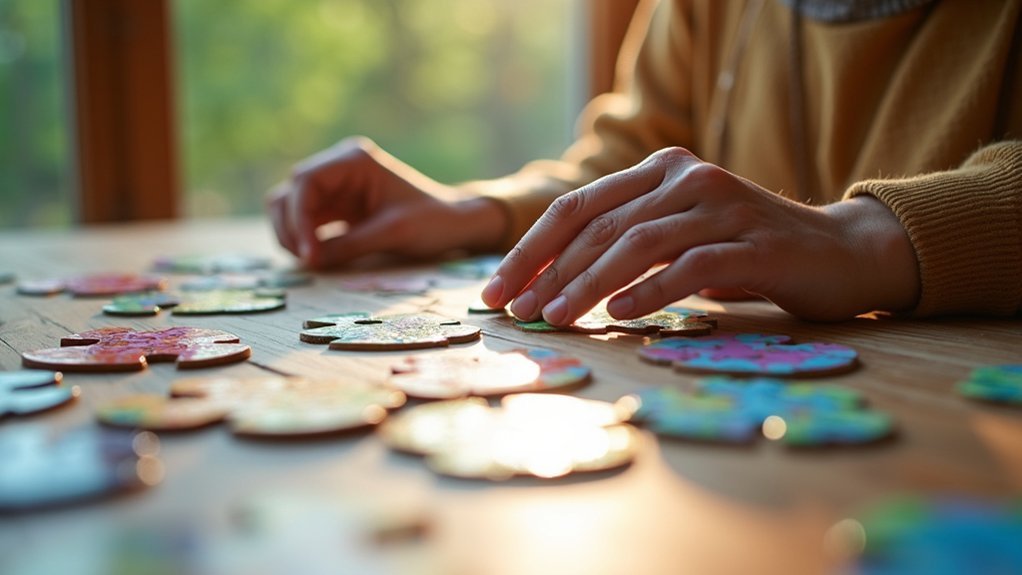
Rebuilding attention skills forms the cornerstone of cognitive recovery after brain injury. To enhance your focus, incorporate targeted brain teasers that challenge your concentration abilities. Word searches and pattern recognition games are particularly effective, as they require sustained attention to detail.
You’ll benefit from implementing a structured approach using task-oriented puzzles that engage neuroplasticity—the brain’s ability to form new connections. Memory games and concentration exercises can help rewire damaged neural circuits while making recovery engaging. Consider trying the Tower of Hanoi puzzle which enhances problem-solving abilities through strategic disk movement.
For maximum effectiveness, set clear goals and track your progress regularly. Combine these focus-building activities with repetitive practice to strengthen new neural pathways.
Remember that consistency is key—even home-based exercises can greatly improve your cognitive function, independence, and overall quality of life when practiced regularly.
Logic Grids for Problem-Solving Rehabilitation
Logic grids stand as powerful tools in cognitive rehabilitation, offering multiple pathways to rebuild problem-solving skills after brain injury.
These puzzles enhance your analytical thinking, strengthen reasoning capabilities, and develop methodical approaches to challenges—all essential skills during recovery.
When incorporated into rehabilitation programs, logic grids provide therapeutic benefits while stimulating cognitive functions that may have been compromised. Research confirms that engaging with these activities helps build cognitive reserve and promotes neural plasticity, supporting long-term recovery outcomes.
You’ll find several types to match your recovery needs:
- Sudoku – Excellent for numerical reasoning and pattern recognition
- Text-based logic puzzles – Rebuild verbal reasoning and deduction skills
- Visual element grids – Support spatial reasoning recovery
Regular practice with these puzzles improves memory retrieval and cognitive flexibility, ultimately supporting your journey back to mental sharpness and problem-solving confidence.
Digital Adaptive Puzzles for Progressive Recovery
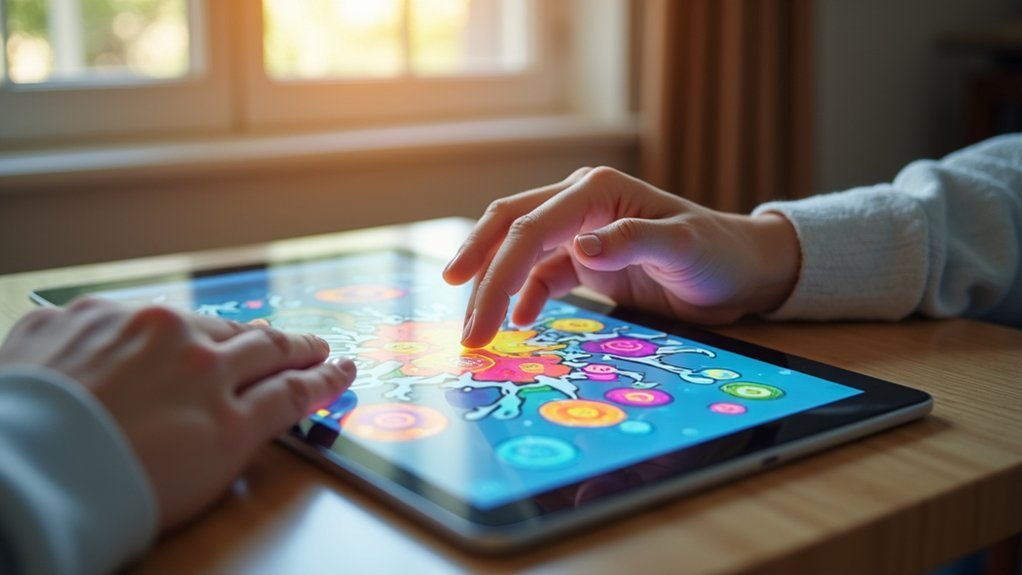
As technology advances, digital adaptive puzzles have emerged as revolutionary tools in cognitive rehabilitation, offering personalized challenges that evolve with your recovery journey. These AI-driven applications monitor your performance and automatically adjust difficulty levels, activating neuroplasticity while preventing frustration or boredom. Recent research demonstrates that adaptive serious games significantly enhance cognitive indicators in elderly patients compared to other game types.
| Platform | Benefits | Best For |
|---|---|---|
| VR Puzzles | Immersive experience, higher engagement | Visual-spatial skills |
| Lumosity | Continuous feedback, progress tracking | Executive function |
| Adaptive Games | Dynamic difficulty adjustment, personalized | Processing speed |
The real power of digital puzzles lies in their ability to provide immediate feedback while tailoring challenges to your specific cognitive needs. Research shows these tools can markedly improve attention, processing speed, and emotional well-being—making your recovery journey more effective and engaging than traditional static exercises.
Frequently Asked Questions
When Should Puzzle Therapy Begin After a Brain Injury?
You should begin puzzle therapy as soon as you’re medically stable, ideally within days or weeks post-injury. Start with simple puzzles that challenge but don’t overwhelm you, following your healthcare provider’s guidance.
How Long Should Daily Puzzle Sessions Last for Optimal Recovery?
You’ll get the most benefit from daily puzzle sessions lasting 15-30 minutes, with multiple short sessions throughout the day rather than one long session. Take breaks when you’re feeling fatigued to prevent setbacks.
Can Puzzles Replace Professional Cognitive Rehabilitation Therapy?
No, puzzles can’t replace professional cognitive rehabilitation therapy. While they’re valuable supplements that engage multiple cognitive abilities, they lack the personalized, structured approach that professional therapists provide for your specific recovery needs.
How Can Caregivers Track Progress With Puzzle-Based Rehabilitation?
You can track puzzle-based rehabilitation progress by maintaining logs of completion times and errors, using validated assessment tools, establishing measurable goals, and encouraging patients to verbalize their problem-solving strategies during sessions.
Are Paper Puzzles More Effective Than Digital for Certain Injuries?
Yes, paper puzzles may be more effective for certain injuries. You’ll benefit from their tactile experience if you have motor skill impairments, and they’re less stimulating if you suffer from light sensitivity or attention deficits.
In Summary
When you’re recovering from a brain injury, puzzles aren’t just entertainment—they’re powerful rehabilitation tools. You’ll find these seven puzzle types help rebuild memory, language, and problem-solving skills while tracking your progress. Remember to start simple and gradually increase difficulty as you improve. By incorporating these brain challenges into your daily routine, you’ll support your recovery journey one puzzle at a time.

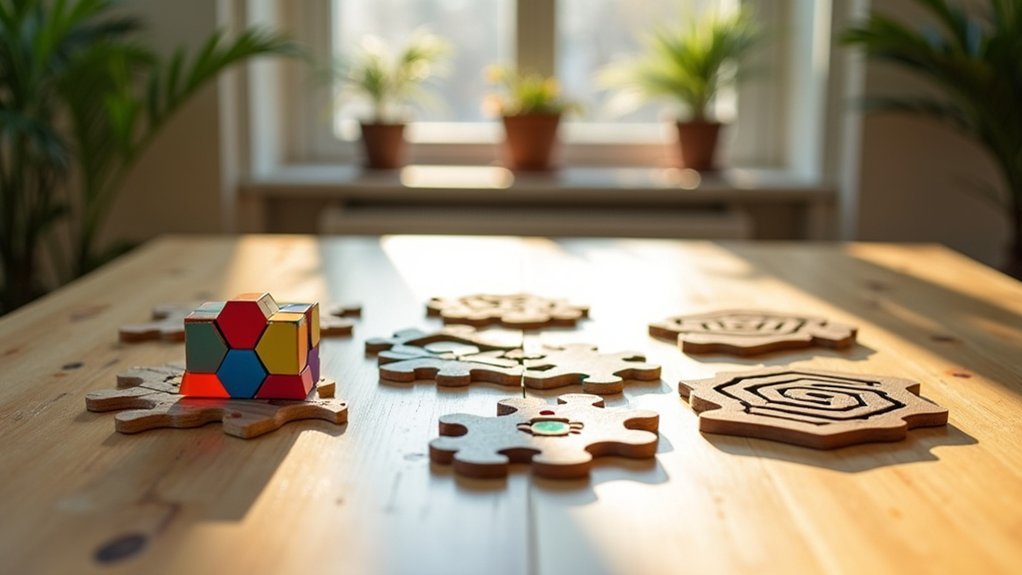
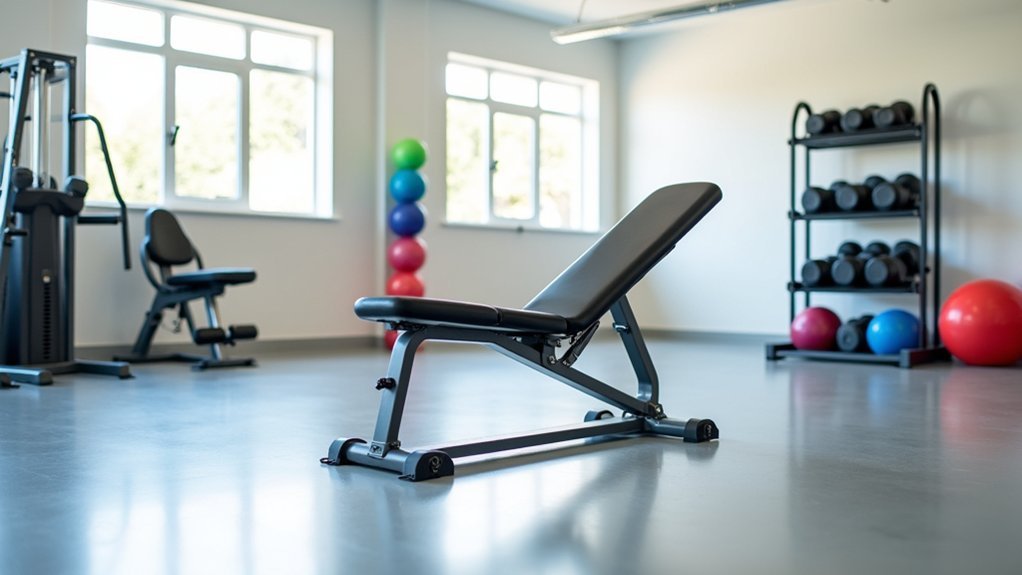
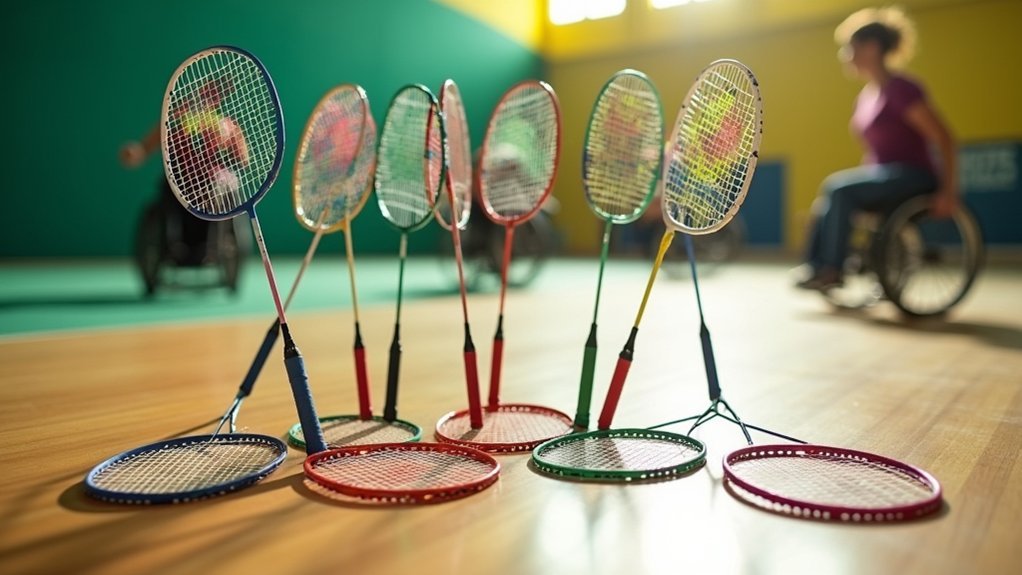
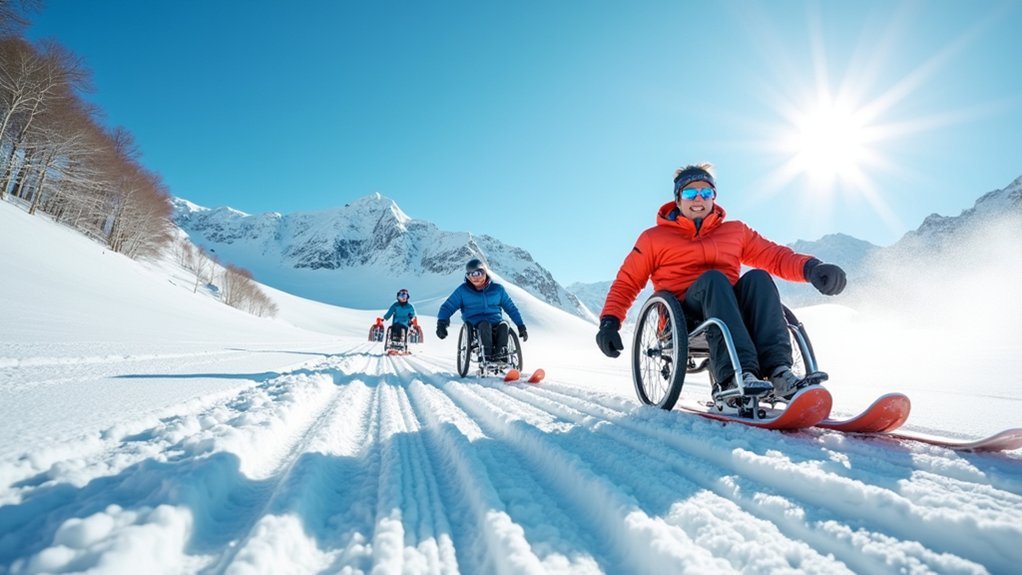
Leave a Reply